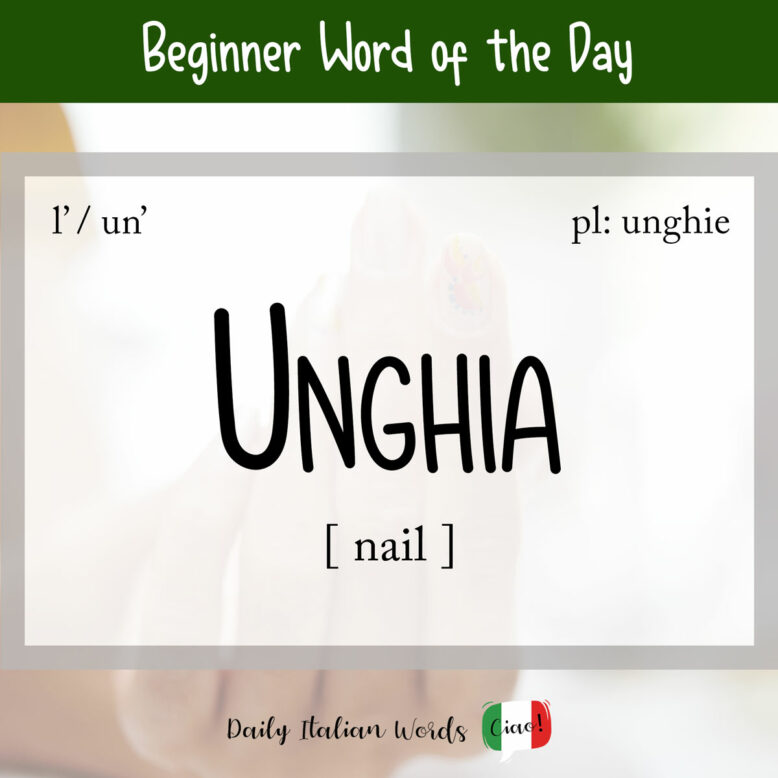The word for a nail, as in the covering on the upper surface of the tip of the finger and toe in primates, is unghia in Italian. If you want to specify which part of the body you are referring to, you can use the terms le unghie delle mani (lit. the nails of the hands) and le unghie dei piedi (lit. the nails of the feet).
Unghia derives from the Tuscan ugna, which in turn comes from the Latin ungula.

Being a feminine noun that starts with a vowel, the definite and indefinite articles are as follows:
- l’unghia = the nail
- le unghie = the nails
- un’unghia = a nail
- delle unghie = (some) nails
L’unghia del dito indice cresce più velocemente di quella del mignolo.
The nail of the index finger grows faster than that of the little finger.
The following verbs often appear in company of unghia, so you may wish to memorise them if nail care is one of your priorities.
- tagliarsi le unghie = to cut one’s nails
- limarsi le unghie = to file one’s nails
- farsi le unghie / farsi fare le unghie = to do one’s nails done / to get one’s nails done
- dipingersi le unghie / farsi dipingere le unghie = to paint one’s nails / to get one’s nails painted
- lasciar crescere le unghie = to let one’s nails grow
- darsi lo smalto sulle unghie = to polish one’s nails

Some common products used to keep our nails clean and healthy include:
- forbicine per le unghie = nail scissors
- spazzolino per le unghie = nail brush
- tagliaunghie = nail clippers
- lima / limetta per le unghie = nail file
Many people, especially those with a nervous disposition, have the bad habit of mangiarsi le unghie (biting one’s nails) and le pellicine circostanti (the surrounding skin).

As for an ingrown nail, it is known as un’unghia incarnita in Italian.
By extension, unghia can also refer to the claws, talons and hooves of animals.
Dobbiamo tagliare le unghie al gatto! Guarda come ha conciato il divano!
We have to cut the cat’s claws! Look at what he did to the couch!
Figuratively, unghia may also refer to an object or part of an object that bears some resemblance to the nail of a human or animal. For example, l’unghia dello scalpello is the flat part of a chisel.
You may also encounter the term unghiata, which is used specifically to describe a scratch made by a fingernail.
Il mio gatto mi ha dato un’unghiata in faccia!
My cat scratched my face!
Much more rarely, you may also hear it used to denote a very small quantity of something, or a very short distance.
Aggiungi ancora un’unghia di zucchero e sarà perfetto.
Just add a little bit more sugar and it will be perfect.
Idioms featuring the word ‘unghia’
Pagare sull’unghia
Literal translation: To pay on the nail
English meaning: To pay immediately in cash
Avere le unghie lunghe
Literal translation: To have long fingernails
English meaning: To be a thief
Difendersi con le unghie e con i denti
Literal translation: To defend oneself with nails and teeth
English meaning: To fight tooth and nail
Mettere / tirare fuori le unghie
Literal translation: To put out / bring out one’s nails
English meaning: To show aggression
Cadere / finire tra le unghie di (qualcuno)
Literal translation: To fall / end up between the fingernails of (someone)
English meaning: To fall into the clutches of (someone)
Heather Broster is a graduate with honours in linguistics from the University of Western Ontario. She is an aspiring polyglot, proficient in English and Italian, as well as Japanese, Welsh, and French to varying degrees of fluency. Originally from Toronto, Heather has resided in various countries, notably Italy for a period of six years. Her primary focus lies in the fields of language acquisition, education, and bilingual instruction.


